The Ground Mounted Solar EPC Market is estimated to be valued at USD 114.7 billion in 2025 and is projected to reach USD 173.0 billion by 2035, registering a compound annual growth rate (CAGR) of 4.2% over the forecast period. The ground mounted solar EPC market is expected to follow a steady upward growth curve over the forecast period. Initial expansion is moderate, driven by increasing development of utility-scale solar farms and infrastructure projects in regions with high solar potential. Mid-period growth accelerates as engineering, procurement, and construction processes become more efficient, enabling faster project execution and cost optimization.
During this phase, adoption expands across both emerging and developed regions, with government incentives, corporate renewable commitments, and public-private partnerships reinforcing uptake. The later years exhibit stable yet sustained growth, supported by replacement projects, the retrofitting of older installations, and continued demand for large-scale solar capacity additions. Year-on-year growth demonstrates a smooth trajectory, indicating gradual market maturation and steady absorption of new capacity.
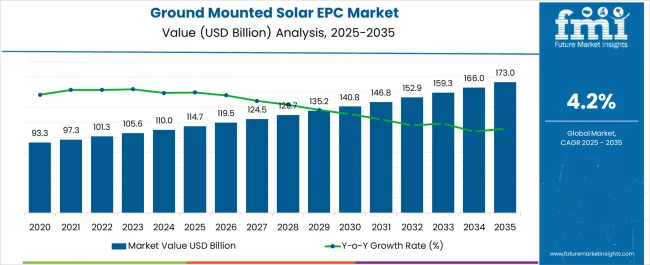
| Metric | Value |
|---|---|
| Ground Mounted Solar EPC Market Estimated Value in (2025 E) | USD 114.7 billion |
| Ground Mounted Solar EPC Market Forecast Value in (2035 F) | USD 173.0 billion |
| Forecast CAGR (2025 to 2035) | 4.2% |
The ground mounted solar EPC market is gaining momentum as industries and governments intensify efforts toward decarbonization and long term energy independence. Increased demand for utility scale renewable energy, combined with favorable policy frameworks, is encouraging widespread adoption of ground mounted photovoltaic systems.
Engineering procurement and construction providers are playing a pivotal role in streamlining project execution, reducing costs, and ensuring timely deployment across diverse geographies. Technological advancements in solar tracking systems, mounting structures, and site optimization have further improved energy yields and financial viability.
As energy consumers in commercial and industrial sectors seek stable pricing and energy autonomy, ground mounted EPC solutions are increasingly being prioritized for their scalability, durability, and integration efficiency. The market outlook remains robust, driven by declining module costs, enhanced financing options, and supportive grid connectivity policies.
The ground mounted solar EPC market is segmented by capacity, application, and geographic regions. By capacity, the ground mounted solar EPC market is divided into 1 to 3 MW, 3 to 10 MW, 10 to 50 MW, and > 50 MW. In terms of application, the ground mounted solar EPC market is classified into Commercial & Industrial and Utility. Regionally, the ground mounted solar EPC industry is classified into North America, Latin America, Western Europe, Eastern Europe, Balkan & Baltic Countries, Russia & Belarus, Central Asia, East Asia, South Asia & Pacific, and the Middle East & Africa.
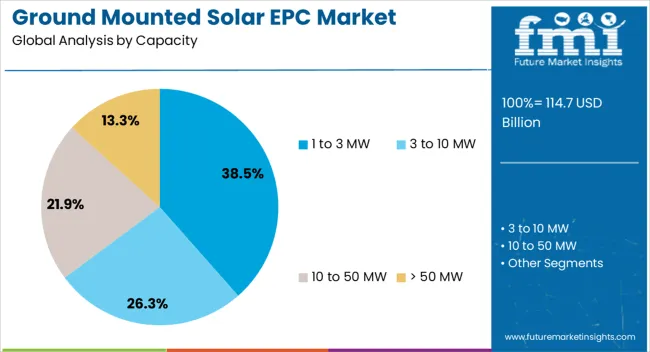
The 1 to 3 MW capacity segment is projected to account for 38.50% of total market revenue by 2025 within the capacity category, establishing itself as the leading range. This dominance is attributed to the segment's suitability for mid-scale installations that offer a balance between land use efficiency and energy output.
Projects in this range are often selected for captive consumption by industries, educational institutions, and infrastructure projects seeking cost-effective and scalable solar integration. The manageable project size enables quicker permitting, streamlined logistics, and faster commissioning, making it a preferred choice for both developers and off-takers.
The growing preference for distributed generation and localized energy solutions continues to support the expansion of this capacity segment within the ground-mounted solar EPC landscape.
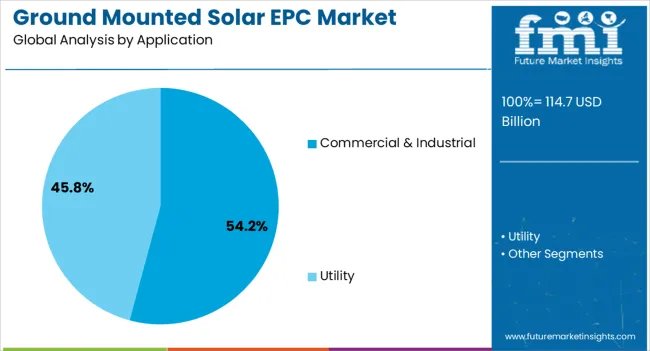
The commercial and industrial application segment is anticipated to hold 54.20% of the total market revenue by 2025 under the application category, maintaining its position as the dominant end use segment. This growth is driven by increasing energy cost pressures, corporate sustainability goals, and regulatory incentives promoting clean energy adoption.
Businesses across manufacturing, logistics, retail, and institutional sectors are investing in ground mounted solar systems to stabilize operational costs and reduce carbon footprints. The ability to customize system design based on site conditions and energy consumption profiles has further contributed to segment preference.
Additionally, the commercial and industrial segment benefits from favorable net metering policies and third-party financing models, which reduce capital burden and accelerate project adoption. These factors collectively reinforce the leadership of this segment in driving demand for ground mounted solar EPC services.
The ground mounted solar EPC market is driven by the growing demand for utility-scale solar, cost reductions in installations, government incentives, and grid integration needs. The market is poised for continued expansion with advancements in solar economics and energy infrastructure.
The ground-mounted solar EPC market is witnessing substantial growth driven by the increasing demand for large-scale solar power projects. As governments and organizations seek to meet renewable energy targets, utility-scale solar farms are becoming a critical part of energy infrastructure. These large projects offer cost-effective solutions for energy generation, providing substantial power to the grid. Ground-mounted systems are ideal for areas with large open spaces and high solar irradiation, making them perfect for industrial, agricultural, and utility applications. The focus on large-scale solar farms ensures a steady rise in demand for EPC services, creating opportunities for companies specializing in large installations and grid integration.
The significant reduction in solar installation costs is a key factor driving the Ground-Mounted Solar EPC Market. With advancements in manufacturing processes, panel efficiency, and economies of scale, solar energy systems have become increasingly affordable. Lower installation and operational costs are making solar power more accessible to a broader range of industries and regions. As the cost of solar panels and components continues to decrease, the overall project economics improve, encouraging more large-scale solar installations. This trend is particularly important for solar farm developers, who benefit from reduced capital expenditures and improved return on investment for ground-mounted projects.
Government policies and incentives continue to play a crucial role in driving growth in the Ground Mounted Solar EPC Market. Many countries are offering financial incentives, tax breaks, and subsidies to encourage the installation of renewable energy projects. These incentives lower the initial capital investment required for large-scale solar projects, making them more attractive to developers and investors. As countries strengthen their commitments to cleaner energy sources, government-backed initiatives are expected to remain a key driver of market growth. Additionally, some regions offer power purchase agreements (PPAs) or feed-in tariffs, which ensure long-term revenue streams for solar projects, further encouraging investment in ground-mounted solar solutions.
As the deployment of ground-mounted solar systems increases, the demand for grid integration solutions is also growing. Effective integration of solar energy into the national grid is essential to ensure stable and efficient energy distribution. Ground-mounted solar farms often require advanced infrastructure to connect to the grid, necessitating the involvement of EPC providers who specialize in large-scale solar projects. The need for energy storage solutions, smart grid technologies, and improved grid management systems is pushing the market toward further expansion. The growth of solar power capacity is directly tied to the grid’s ability to accommodate fluctuating energy outputs, ensuring a reliable energy supply.
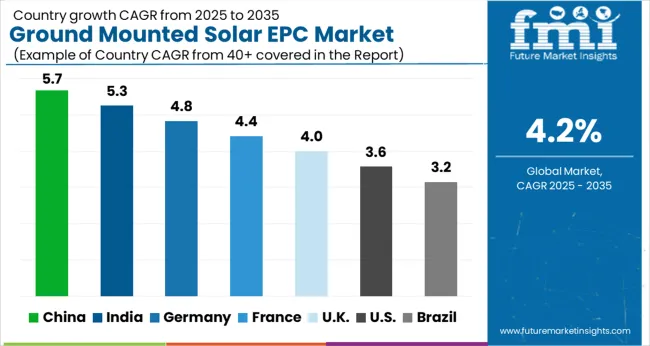
| Countries | CAGR |
|---|---|
| China | 5.7% |
| India | 5.3% |
| Germany | 4.8% |
| France | 4.4% |
| UK | 4.0% |
| USA | 3.6% |
| Brazil | 3.2% |
The ground mounted solar EPC market is projected to expand globally at a CAGR of 4.2% from 2025 to 2035, supported by the growing demand for large-scale solar installations and renewable energy projects. China leads with a CAGR of 5.7%, driven by the country’s rapid expansion in solar energy capacity and government-backed initiatives aimed at achieving energy independence. India follows closely with a CAGR of 5.3%, fueled by the growing adoption of solar energy in both urban and rural areas and the government’s push for clean energy. France grows at 4.4%, supported by increased investments in solar power as part of its national energy transition strategy. The UK achieves a CAGR of 4.0%, driven by government incentives and increasing demand for solar installations in residential and commercial sectors. The USA reaches a CAGR of 3.6%, reflecting steady growth in large-scale solar farms, especially in states with favorable solar conditions. This analysis highlights Asia-Pacific as the leading growth region for ground-mounted solar EPC projects, while Europe and North America continue to play significant roles in driving global solar energy adoption through policy support and large-scale installations..
China is projected to post a CAGR of 5.7% during 2025–2035, surpassing the global 4.3% for ground-mounted solar EPC. This growth is primarily driven by continued government investment in solar infrastructure, including utility-scale solar farms, and a strong push towards energy independence. China’s commitment to renewable energy adoption has led to the rapid deployment of solar energy systems across vast land areas, particularly in desert and rural regions, where solar farms have a significant potential. Government-backed incentives and subsidies, coupled with large-scale installations, are expected to sustain this high growth rate. The country’s continued focus on clean energy projects, alongside advancements in solar technology, positions it as the leading player in the ground-mounted solar EPC market.
India is expected to achieve a CAGR of 5.3% for 2025–2035, above the global 4.3%. Growth in the country is primarily driven by its ambitious renewable energy targets and the expanding adoption of solar farms, especially in rural and semi-rural areas. The government's strong commitment to increasing solar power capacity, including the implementation of the National Solar Mission and various financial incentives, is a key driver for ground-mounted solar EPC projects. The rising demand for clean energy and the focus on reducing carbon footprints in both urban and rural areas further push the market growth. The increase in foreign direct investments (FDI) and partnerships with international solar developers is also contributing to this upward trend.
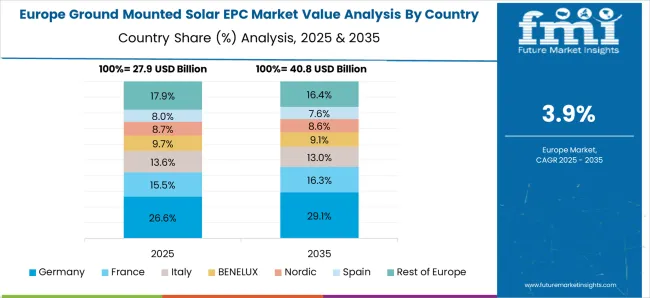
France is expected to grow at a CAGR of 4.4% for 2025–2035, following the global 4.3% trajectory. France’s renewable energy strategy, which includes a strong push for increasing solar capacity, plays a vital role in the expansion of ground-mounted solar projects. The country's abundant sunlight, particularly in southern regions, makes it an ideal location for large-scale solar installations. The French government has introduced various initiatives to encourage solar energy production, including financial incentives, subsidies, and land grants for ground-mounted solar systems. The increasing focus on energy independence and decarbonization, along with investment in energy storage solutions, will support growth in the sector.
The UK is projected to post a CAGR of 4.0% for 2025–2035, showing slight growth above the global 4.3%. This growth is driven by the country’s increasing reliance on renewable energy sources to meet decarbonization targets. The UK has seen significant investments in ground-mounted solar projects, particularly in regions with high solar irradiance. Government initiatives such as Contracts for Difference (CfD) and feed-in tariffs have also contributed to the expansion of the ground-mounted solar EPC market. Furthermore, the increasing shift towards energy storage and grid stability solutions supports the adoption of solar power across industrial and commercial sectors.
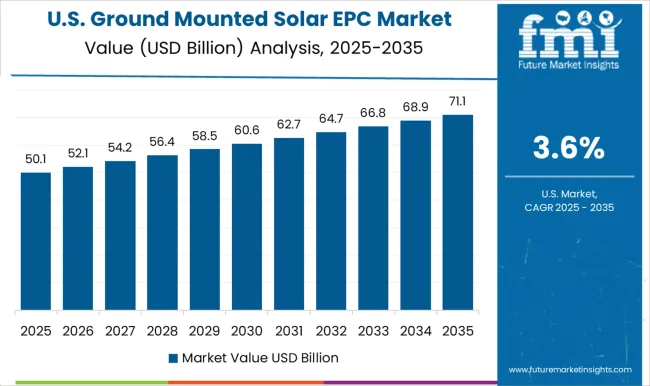
The USA is projected to grow at a CAGR of 3.6% for 2025–2035, slightly below the global 4.3%. This growth is driven by the increasing adoption of ground-mounted solar systems in utility-scale solar farms across the country. The USA government’s renewable energy incentives, such as the Investment Tax Credit (ITC), have fueled the installation of ground-mounted solar projects, particularly in states like California, Texas, and Nevada, where solar energy potential is high. The increasing focus on clean energy goals and the rise of corporate procurement of renewable energy further contribute to market growth. While challenges exist, such as land acquisition and regulatory approvals, growth in renewable energy projects continues to propel the market forward.
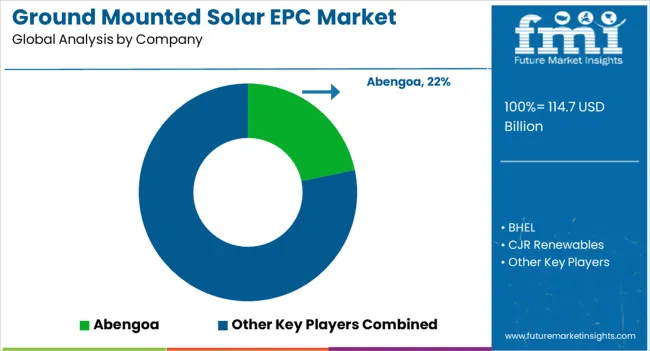
The market is led by prominent global solar energy and infrastructure companies such as Abengoa, BHEL, Mahindra Susten, and Larsen & Toubro Limited. These companies compete on cost efficiency, project scale, and the ability to deliver reliable solar solutions for utility-scale projects. Abengoa is a key player in large-scale solar projects, providing integrated EPC services and focusing on solar power plants worldwide. BHEL brings deep expertise in the power sector, particularly in the development of solar plants for both industrial and governmental projects. Mahindra Susten leverages its strong brand and infrastructure capabilities to deliver robust solar solutions, with a significant presence in India’s solar EPC market. Larsen & Toubro Limited provides end-to-end solutions for solar power systems, backed by its strong engineering and project execution capabilities.
Goldi Solar, Siemens Gamesa Renewable Energy, Vikram Solar Ltd., and Waaree Energies Ltd. also hold significant positions, focusing on expanding solar project footprints across regions. These companies compete by innovating in cost-effective project execution and integration of solar solutions with battery storage technologies. Competitive strategies in this market focus on scaling operations in emerging markets like India and Southeast Asia, where solar adoption is expanding rapidly.
| Item | Value |
|---|---|
| Quantitative Units | USD 114.7 Billion |
| Capacity | 1 to 3 MW, 3 to 10 MW, 10 to 50 MW, and > 50 MW |
| Application | Commercial & Industrial and Utility |
| Regions Covered | North America, Europe, Asia-Pacific, Latin America, Middle East & Africa |
| Country Covered | United States, Canada, Germany, France, United Kingdom, China, Japan, India, Brazil, South Africa |
| Key Companies Profiled | Abengoa, BHEL, CJR Renewables, Goldi Solar, JUWI, Jakson Group, Mahindra Susten, LARSEN & TOUBRO LIMITED, Siemens Gamesa Renewable Energy, SUNEL Group, Tata Power Solar Systems Ltd., The SOLA Group, VIKRAM SOLAR LTD., and Waaree Energies Ltd. |
| Additional Attributes | Dollar sales for the period 2024–2035, they would focus on understanding the share of ground-mounted systems within the global solar EPC market and identifying key growth drivers such as government renewable energy targets, incentives, and cost reductions in solar technology. |
The global ground mounted solar EPC market is estimated to be valued at USD 114.7 billion in 2025.
The market size for the ground mounted solar EPC market is projected to reach USD 173.0 billion by 2035.
The ground mounted solar EPC market is expected to grow at a 4.2% CAGR between 2025 and 2035.
The key product types in ground mounted solar EPC market are 1 to 3 mw, 3 to 10 mw, 10 to 50 mw and > 50 mw.
In terms of application, commercial & industrial segment to command 54.2% share in the ground mounted solar EPC market in 2025.






Our Research Products

The "Full Research Suite" delivers actionable market intel, deep dives on markets or technologies, so clients act faster, cut risk, and unlock growth.

The Leaderboard benchmarks and ranks top vendors, classifying them as Established Leaders, Leading Challengers, or Disruptors & Challengers.

Locates where complements amplify value and substitutes erode it, forecasting net impact by horizon

We deliver granular, decision-grade intel: market sizing, 5-year forecasts, pricing, adoption, usage, revenue, and operational KPIs—plus competitor tracking, regulation, and value chains—across 60 countries broadly.

Spot the shifts before they hit your P&L. We track inflection points, adoption curves, pricing moves, and ecosystem plays to show where demand is heading, why it is changing, and what to do next across high-growth markets and disruptive tech

Real-time reads of user behavior. We track shifting priorities, perceptions of today’s and next-gen services, and provider experience, then pace how fast tech moves from trial to adoption, blending buyer, consumer, and channel inputs with social signals (#WhySwitch, #UX).

Partner with our analyst team to build a custom report designed around your business priorities. From analysing market trends to assessing competitors or crafting bespoke datasets, we tailor insights to your needs.
Supplier Intelligence
Discovery & Profiling
Capacity & Footprint
Performance & Risk
Compliance & Governance
Commercial Readiness
Who Supplies Whom
Scorecards & Shortlists
Playbooks & Docs
Category Intelligence
Definition & Scope
Demand & Use Cases
Cost Drivers
Market Structure
Supply Chain Map
Trade & Policy
Operating Norms
Deliverables
Buyer Intelligence
Account Basics
Spend & Scope
Procurement Model
Vendor Requirements
Terms & Policies
Entry Strategy
Pain Points & Triggers
Outputs
Pricing Analysis
Benchmarks
Trends
Should-Cost
Indexation
Landed Cost
Commercial Terms
Deliverables
Brand Analysis
Positioning & Value Prop
Share & Presence
Customer Evidence
Go-to-Market
Digital & Reputation
Compliance & Trust
KPIs & Gaps
Outputs
Full Research Suite comprises of:
Market outlook & trends analysis
Interviews & case studies
Strategic recommendations
Vendor profiles & capabilities analysis
5-year forecasts
8 regions and 60+ country-level data splits
Market segment data splits
12 months of continuous data updates
DELIVERED AS:
PDF EXCEL ONLINE
Ground Mounted Solar PV Module Market Size and Share Forecast Outlook 2025 to 2035
Solar EPC Market Size and Share Forecast Outlook 2025 to 2035
Rooftop Solar Epc Market Size and Share Forecast Outlook 2025 to 2035
Utility Solar EPC Market Size and Share Forecast Outlook 2025 to 2035
Underground Cabling EPC Market Size and Share Forecast Outlook 2025 to 2035
Utility Solar PV EPC Market Size and Share Forecast Outlook 2025 to 2035
Residential Solar EPC Market Size and Share Forecast Outlook 2025 to 2035
Solar Module Recycling Service Market Size and Share Forecast Outlook 2025 to 2035
Solar Tracking Module Market Size and Share Forecast Outlook 2025 to 2035
Ground Grid Tester Market Size and Share Forecast Outlook 2025 to 2035
Ground and Precipitated Calcium Carbonate Market Size and Share Forecast Outlook 2025 to 2035
Solar Analyzer Market Size and Share Forecast Outlook 2025 to 2035
Solar Aluminum Alloy Frame Market Size and Share Forecast Outlook 2025 to 2035
Solar Grade Monocrystalline Silicon Rods Market Analysis - Size, Share, and Forecast Outlook 2025 to 2035
Solar Vehicle Market Size and Share Forecast Outlook 2025 to 2035
Solar PV Module Market Size and Share Forecast Outlook 2025 to 2035
Solar Encapsulation Market Size and Share Forecast Outlook 2025 to 2035
Solar Pumps Market Analysis - Size, Share, and Forecast Outlook 2025 to 2035
Solar Mobile Light Tower Market Size and Share Forecast Outlook 2025 to 2035
Solar PV Recycling Market Size and Share Forecast Outlook 2025 to 2035

Thank you!
You will receive an email from our Business Development Manager. Please be sure to check your SPAM/JUNK folder too.
Chat With
MaRIA